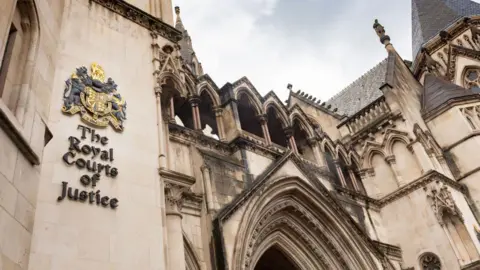How do you challenge a planning decision?
 Getty Images
Getty ImagesThis week campaigners against plans to build an incinerator in the heart of a UNESCO World Heritage site officially launched a legal challenge against approval granted by the government.
The facility, planned for land on Portland Port, was given the go-ahead in September, despite initially being refused by Dorset Council.
Members of the Stop Portland Waste Incinerator (SPWI) group have now filed a case to the High Court for a statutory review of the decision in a bid to quash the government's ruling.
But what are the rules around challenging planning decisions, what is a statutory review, and what are the chances of the campaigners succeeding?
What is the initial process?
Hundreds of planning decisions are made up and down the country every week by Local Planning Authorities (LPAs) - which are usually local councils.
If a planning permission decision goes against the LPA’s local plans for development, or includes a condition that is objected to, then interested parties have the right to appeal the verdict.
That is what happened in the case of the incinerator, with developer Powerfuel Portland appealing the decision by Dorset Council to refuse planning permission for its proposed energy recovery facility.
What is the Planning Inspectorate?
Once an appeal is launched it heads to the government's Planning Inspectorate, which then decides if it is valid, and what sort of investigation is required.
Public inquiries are reserved for complex cases, including those where legal issues may need to be considered - such as with the Portland incinerator judgement.
Following the inquiry, the inspector writes a recommendation that is then sent to the Secretary of State for Housing, Communities and Local Government, who has the final say on any decision.
When it comes to the Portland case, the government followed the inspector's recommendation and approved the plans - overturning Dorset Council's earlier decision.
Why have SPWI launched legal proceedings?
Ricardo Gama, an environmental solicitor at Leigh Day - the legal firm representing the campaigners - said the SPWI group "believe that Powerfuel Portland have put forward a speculative scheme in completely the wrong place, contrary to planning policy".
The group said the Secretary of State's decision "does not satisfy" Dorset Council’s Waste Plan, which designates specific sites for waste disposal nearer to major waste generating settlements in the county.
Debbie Tulett, who has filed the legal challenge, said: "It is both devastating and frustrating to see the government’s opinion that the incinerator would do no harm to the iconic landscape of the Isle of Portland.
"While it is difficult to legally challenge this aspect of their decision, we are able to take the government to task on their overlooking of planning policy."
What does Powerfuel Portland say?
Giles Frampton, Powerfuel Portland director, said: "The planning decision itself, including the identified benefits and limited localised impact of the project, is not being contested in the legal challenge.
"What is claimed is that the Secretary of State did not act legally in making the decision."
He said Dorset Council has stated that it consulted expert legal advice and had "concluded any challenge on this basis would likely fail in court".
Mr Frampton added: "Despite this, Stop Portland Waste Incinerator group has decided to launch a legal challenge against the Secretary of State's decision, which will be robustly defended."
What is a statutory review?
If an interested party, such as the campaigners against the incinerator plans, think the verdict of a planning inspectorate is legally incorrect, then they can take the case to the High Court.
It oversees the most complex and serious civil cases in England and Wales, including judicial reviews into the actions of government departments and public bodies.
Legal planning challenges come in two forms - a judicial review or a statutory review.
While both can only be used to question judgements that may be legally incorrect, Mr Gama explained: "Certain decisions, including decisions by the Secretary of State to grant planning permission, can only be challenged using the statutory review procedure."
What happens next?
Once an application for a statutory review is filed, it must receive permission to be heard from a High Court judge - which Leigh Day predicts will take "a couple of months" in the case of the SPWI group's challenge.
A hearing would then take place at the Royal Courts of Justice, with the points of law argued by both sides before the judge comes to a verdict.
In a statutory review, the aim for an appealing party is for a decision to be quashed - meaning the case would then be sent back to the planning inspectorate to be re-examined.
This could still end with the inspectorate approving the decision.
If a statutory review fails, then you may be able to take your case to the Court of Appeal - although this would incur even more costs and you have no guarantee that it would overturn the High Court's verdict.
You can follow BBC Dorset on Facebook, X, or Instagram.
